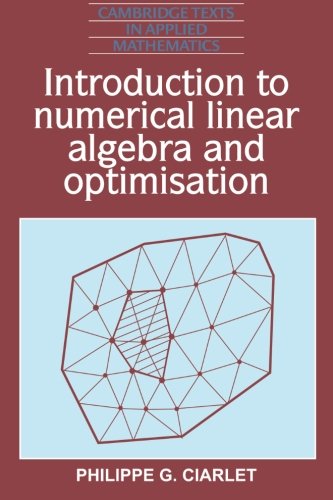Introduction to numerical linear algebra and optimisation epub
Par morris dale le mardi, mai 31 2016, 08:19 - Lien permanent
Introduction to numerical linear algebra and optimisation. Philippe G. Ciarlet

Introduction.to.numerical.linear.algebra.and.optimisation.pdf
ISBN: 0521339847,9780521339841 | 447 pages | 12 Mb

Introduction to numerical linear algebra and optimisation Philippe G. Ciarlet
Publisher: CUP
Shafarevich at the Faculty of Mechanics and Mathematics of Moscow State University. A new sub-chapter has also been introduced on option pricing. Topics covered are – matrices; determinants, notation, linear algebra: ordinary differential equations; Laplace transforms, transfer functions, the s-plane, poles & zeroes: numerical methods; numerical integration, iteration, convergence: data typing & structured text: statistics; To establish a mathematical basis for understanding the more theoretical aspects of control and automation and to introduce the Matlab and Simulink packages for use in subsequent modules. Polygon Clipping and Polygon Scan Conversion. Interactions over the modulus of elasticity response. More speci cally we will cover most of these topics: … http://www.math.ubc.ca/~cass/courses/m307/intro.pdf * pdf. Unhappy users abound (check out the user comments at http://blogs.mathworks.com/loren/2012/09/12/the-matlab-r2012b-desktop-part-1-introduction-to-the-toolstrip/ for example). This volume is dedicated to the theme “Combinatorial Optimization – Theoretical Computer Science: Interfaces and Perspectives” and has two main objectives: the first is to show that bringing together operational research and theoretical This book is the result of a series of lectures on linear algebra and the geometry of multidimensional spaces given in the 1950s through 1970s by Igor R. The model was finally employed in an optimization analysis to arrive at an optimal set of RVE parameters that minimizes the difference between the predicted and experimental moduli of elasticity. Also in the solution of optimization problems, such methods are essential. A brief set of notes on numerical linear algebra. The Intel Math Kernel Library (MKL) is now at version 11.0. The MKL is a highly optimised numerical library for Intel platforms that covers subjects such as linear algebra, fast fourier transforms and random numbers. In the numerical-statistical approach, multiple realizations, finite element simulations of materials unit cells, and appropriate statistical procedures are employed. It comes up a lot in numerical linear algebra and in optimization problems. The best you can do is minimise the thing and pretend it doesn't exist.